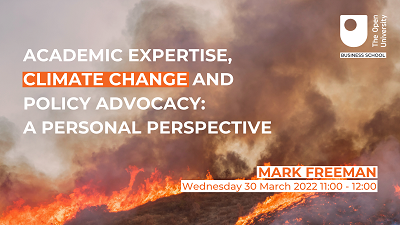Our research and public engagement
PUFin engages in a number of research activities and events in order to further our understanding and to share findings with stakeholders and the public.
Blog
A Comparison of Financial Outturns on Quantitative Easing Programmes
November 2025 - Christopher Mahon, CFA, Senior fund manager at Columbia Threadneedle Investments and Visiting Fellow at The Open University Business School, authors this blog post on Quantitative Easing.
News
Published findings in understanding financial capability needs amongst Black teenagers
17 May 2024 - This research report sets out the findings to explore financial capability needs and lived experiences among Black teenagers. Read the research report.
Talking sustainability and business with Deborah Meaden
20 April 2023 - Dragons’ Den star Deborah Meaden has shared her thoughts on sustainability and business in an exclusive interview with PUFIN centre director Ali Ataullah and co-director Rodion Skovoroda.
Ali and Rodion were the academic consultants for the recent OU and BBC co-production, The Big Green Money Show, on Radio 5 Live and BBC Sounds. Watch their exclusive interview with Deborah Meaden on the OU Connect page.
Property rights, markets, and externalities in corporate external reporting theory and practice
13 June 2022 - Dr Carien van Mourik gives this presentation
CEO pay, bonuses and targets under fresh scrutiny
13 May 2022 - PUFin member Rodion Skovoroda's comments on the recent rise in bonus pay were used in an article in the Financial Times.
Can Tripping Save the Planet?

Our visiting academic Simran Sethi writes about the mysterious connection between psychedelic use and eco-activism in this article for Nautilus.
How interest-free loans are helping the floods victims of Pakistan
 On August 26, Pakistan declared emergency in the face of calamitous floods. According to the United Nations (UN), more than 1,300 lives have been lost, tens of millions of people are now homeless, one-third of this vast country is submerged under water, over a million livestock is dead and crops of this agricultural country have been wiped out.
On August 26, Pakistan declared emergency in the face of calamitous floods. According to the United Nations (UN), more than 1,300 lives have been lost, tens of millions of people are now homeless, one-third of this vast country is submerged under water, over a million livestock is dead and crops of this agricultural country have been wiped out.
Dr Anwar Halari explores how interest-free loans are helping flood victims in this blog.
The dark story behind cocoa
 The US Department of Labour has estimated that 1.56 million children carry out hazardous work on cocoa farms in Ghana and the Ivory Coast. The topic is more relevant than ever in light of the partial COVID-19 lockdown in the Ivory Coast which saw a sharp rise in child labour.
The US Department of Labour has estimated that 1.56 million children carry out hazardous work on cocoa farms in Ghana and the Ivory Coast. The topic is more relevant than ever in light of the partial COVID-19 lockdown in the Ivory Coast which saw a sharp rise in child labour.
The child labour plague has been long under the spotlight of international bodies, foundations, and standard setters. Nevertheless, the cocoa industry remains still dogged in controversy amid allegations of child labour and slavery, despite promises to eradicate it in 2001. Our research examines the issues of child labour, forced child labour and unsustainable farming practices within the chocolate industry, with a specific focus on the discourse about Nestlé’s Ivory Coast cocoa supply chain.
Despite introducing sustainability programs, Nestlé and several other international companies continue to source cocoa from the Ivory Coast. Will they keep their promises to eradicate the worst forms of child labour, including slavery? Only time will tell, but after two decades the problems persist.
This PUFin event, held in April 2021, brought academic and non-academic experts together to discuss this "wicked problem" of child labour in society.
The Chocolate Scorecard

We eat chocolate for comfort, celebration, and indulgence. But what’s really going into the chocolate we buy?
The Chocolate Collective have surveyed the world’s biggest chocolate companies to find out!
With guidance from university experts, including PUFin's Dr Cristiana Bernardi, 90% of the industry have been graded and the results published. Companies have been scored on six measures, including transparency, child labour and living income.
Some are rising to the challenge, but others continue to ignore consumer demand for chocolate that’s free of child labour, poverty, deforestation and is good for people and the planet. Read more and see the results Want to buy guilt-free Easter chocolate? research blog.
Events
Financial capability of young people from the Black ethnic group
Tuesday, April 16, 2024 - 11:00 to 12:30
This webinar, presented by PUFin and Money and Pensions Service (MaPS), explores issues related to financial capability of young people aged 15 to 17 and young adults aged 18 to 24, with a particular focus on people from the Black ethnic group.
An Overview of Quantitative Methods for Business, Finance & Law
POSTPONED - Tuesday, March 28, 2023 - 11:00 to 13:00
This webinar, presented by Professor Ali Ataullah, Dr Cristiana Bernardi and Dr Rodion Skovoroda of PUFIN, will explore different types of quantitative research undertaken in business, finance, law and wider social sciences.
Climate Change and Mutual Fund Voting on Environmental Proposals
Tuesday, September 13, 2022 - 13:30
Join Professor Alexandre Garel as we explore whether investors’ personal experience of climate change affects their voting behavior on environmental issues.
Fear and Favouritism in the Time of COVID-19
Wednesday, June 8, 2022 - 15:00
In this PUFIN research seminar, join Professor Ben Ho as we look at fear and favouritism in the time of COVID-19.
Report launch: Corporate Britain and Covid-19

This event, held on 21 April, launched new research by The Open University, Nottingham University, the University of Western Ontario and the High Pay Centre.
The report examines how many UK companies cut CEO pay in response to Covid-19, the scale of those cuts, and the particular governance and shareholder characteristics of those companies.
In particular, the research examines the relationship of boardroom diversity and institutional share ownership with covid-related executive pay reductions.
Academic expertise, climate change and policy advocacy: A personal perspective

Across the world, governments proactively seek advice from academic experts to generate ideas and analysis for policy purposes. But on what terms should this engagement between academics and the public sector be contracted? Do academic experts have “…special status as providers of neutral and apolitical evidence…”, or are they instead “…one type of actor among others providing input in the political system…” (Christensen, 2021)? How can academics who advise on policy can avoid putting personal beliefs before expert recommendations?
In this PUFin event, held on 30 March 2022, Professor Mark Freeman draws on his experiences from working with the public sector around climate change economics, to explain the inherent difficulties he sees in being an academic policy advocate in such a politically charged field.
Watch the recording on YouTube.
Publications
- Oliver, M. J., & Rutterford, J. (2020). ‘The capital market is dead’: the difficult birth of index‐linked gilts in the UK. The Economic History Review, 73(1), 258-280.
- Gounopoulos, D., Loukopoulos, G., & Loukopoulos, P. (2020). CEO education and the ability to raise capital. Corporate Governance: An International Review
- Omar, A. M., Wisniewski, T. P., & Yekini, L. S. (2019). Psychopathic traits of corporate leadership as predictors of future stock returns. European Financial Management, 25(5), 1196-1228.
- Prabhakar, R. (2019). Financial inclusion: A tale of two literatures. Social Policy and Society, 18(1), 37-50.
- Bernardi, C. And Stark, A.W. (2018). “Environmental, social and governance disclosure, integrated reporting, and the accuracy of analyst forecasts”, The British Accounting Review, Volume 50, Issue 1, pp. 16-31.
- Van Mourik, C., & Walton, P. (2018). The European IFRS endorsement process–in search of a single voice. Accounting in Europe, 15(1), 1-32
- Ataullah, A., Vivian, A., & Xu, B. (2018). Time-varying managerial overconfidence and corporate debt maturity structure. The European Journal of Finance, 24(2), 157-181.
- Skovoroda, R., & Bruce, A. (2017). Shifting the goalposts? Analysing changes to performance peer groups used to determine the remuneration of FTSE 100 CEOs. British Journal of Management, 28(2), 265-279.
- Richards, D. W., Fenton-O'Creevy, M., Rutterford, J., & Kodwani, D. G. (2018). Is the disposition effect related to investors’ reliance on System 1 and System 2 processes or their strategy of emotion regulation?. Journal of Economic Psychology, 66, 79-92..
- Wang, Y., & Lahr, H. (2017). Takeover law to protect shareholders: Increasing efficiency or merely redistributing gains?. Journal of Corporate finance, 43, 288-315.
To view the full list of all Centre for Public Understanding of Finance (PUFin) open access research publications, please visit the Open Research Online - PUFin webpage.
